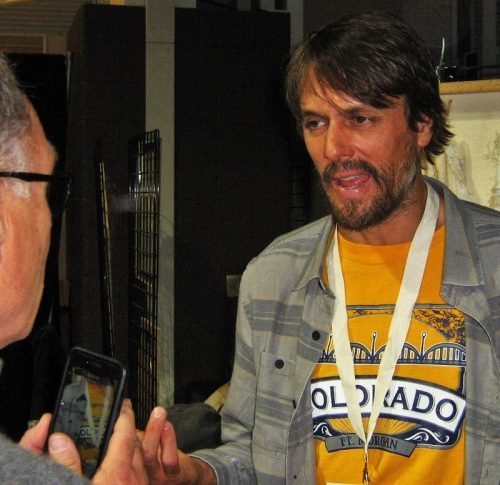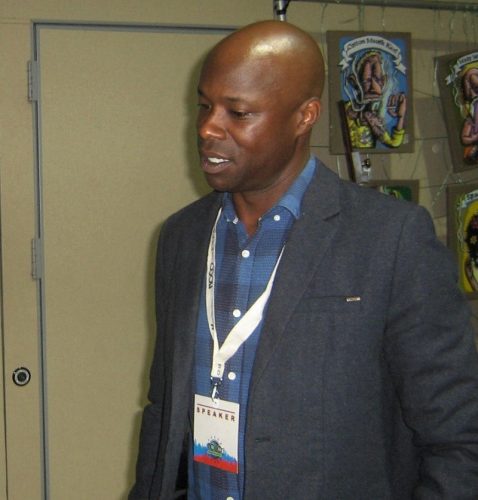An all-star roster of retired professional athletes are raising their voices for medical cannabis and cannabinoids.
Six former pros — five of them ex-NFL players — led a panel discussion about medical cannabis at the NoCo Hemp Expo held in Loveland, Colo., last week. All are currently involved with Athletes for Care, a non-profit organization that raises awareness about health issues facing the sports community. The group also focuses on cannabis as an alternative treatment option for athletes.
The conversation was headlined by former NHL hockey player Riley Cote, the event’s keynote speaker and Athletes for Care co-founder. While it might appear selfish to have a group of ex-athletes sit around and discuss why they use of cannabis for their health issues, the reality was quite different. he said.
“It’s just about using these guys and myself as the stories to legitimize this,” Cote told a packed auditorium.
Current and former pro athletes “can actually show the players’ associations that instead of these guys on opiods and…drinking alcohol and having addiction problems, maybe we can prevent all that — if we gave them a sustainable way to manage pain, sleep and anxiety in the first place,” he said.
Following Cotes’ address, a panel of five ex-NFL athletes — four of whom were cheered on by the audience in recognition for their time with the hometown Denver Broncos.
Related: Catch up on football’s drive for medical marijuana and CBD
All five — Jake Plummer, Rick Upchurch, Charlie Adams, Reuben Droughns and Tennessee Titans vet Justin Sandy — detailed their struggles with chronic pain and healthcare issues during and after their football careers, and talked about how marijuana and other cannabinoids have helped with their ailments.
Upchurch said that he’s currently taking cannabidiol (CBD) to help with his fight against Chronic Myelogenous Leukemia (CML). But he also chronicled how marijuana kept him off opioids during his playing days.
“I kept telling our trainers and our doctors that I wasn’t going to take any of the opiates, because… they made me sick,” said Rick Upchurch, who played wide receiver for the Broncos from 1975 to 1983. “After a game I did my marijuana,” he told a rapt audience. “I could sleep, I could eat, I was focused, I got my rest.”
Today, cannabis is helping Upchurch control his leukemia, he said.
“I take chemotherapy every day, three pills a day. It helps to neutralize that, it helps me with my neuropathy. So gang, I’m telling you right now CDB helps, marijuana helps. It’s not the devil. As a matter of fact it’s an angel for me,” he said.

Former NFL quarterback Plummer is an Athletes for Care co-founder. He’s also known nationally for his advocacy regarding CBD research, while calling for professional athletes to be allowed access to cannabinoids. However, Plummer told the NoCo Hemp Expo audience that he mostly stayed away from cannabis during his playing days.
“The fear of getting caught kept me away from it, because that’s letting your teammates down if you get caught,” he said.
In retirement — and following a series of hip surgeries to repair painful injuries sustained during his career — he got his medical marijuana “red card” in Colorado.
“I started taking CBD oil and that’s when it really happened,” Plummer continued. “Like wow, the pain went away. I can get down and play with Legos on the floor with my kids. And if my wife says, ‘Hey, can you get me some water?’ I’m like, boom! I jump up, run over, get water and run back,” he added to laughter.
“I’m 43; I played ten years of NFL football, four straight years of college football and two straight years of high school football. So I got my ass beat up a lot. I know the beating, and it hurts. I know that the players that are going through it now should be able to choose (cannabis as a treatment). That’s why I’m here,” he said.
The panelists are part of a growing cadre of professional athletes going public in their support of THC, CBD and other cannabinoids as alternative treatments not only for pain but for the symptoms of traumatic brain injury and chronic traumatic encephalopathy (CTE), a degenerative brain disease that has been diagnosed in many former NFL players.
They also see cannanbinoids as a way of combating the growing opiod epidemic. And abuse of opiods is especially problematic with NFL players. A 2011 study by the National Institutes of Health found that NFL players had a three times greater prevalence of opiod use – and abuse – than the general population.
Former running back Reuben Droughns, who earned a Super Bowl ring during his time with the New York Giants, acknowledged his struggles with opiods. But he added that current NFL players would be putting their careers at jeopardy if they spoke out in favor of cannabis.
“I think it takes guys like us to get the word out,” he said, adding that more retired pro athletes need to speak up.
Related: Former football star Ricky Williams launches his own cannabis brand
The panelists also expect that NFL player access to cannabinoids will be an issue in 2020, when the league’s current CBA (collective bargaining agreement) is up for renegotiation. Last year, the NFL told the NFL Players Association it was willing to study the potential of marijuana for player’s pain management.
In the interim, however, the panelists at the NoCo Hemp expo event were skeptical about the possibility of a grass-root, pro-cannabis movement among NFL players.

Former wide receiver Charlie Adams, who now has a career in the healthcare industry, said that only the top NFL players are free to speak publically without retaliation on what still remains a controversial issue in professional athletics.
“If (former quarterback) Payton Manning said, ‘what got me back from my neck injury to win the Super Bowl with the Broncos was cannabis and CBDs,’ then yeah, possibly,” Adams told The Cannabist following the panel event. “But until it’s a superstar player it’s just going to fall on deaf ears.”
“Current players shouldn’t put their necks out there, in risk of their careers.” Jake Plummer told The Cannabist. “But there should be a bridge between current and former players, so they understand what they’re going to deal with, 15 years down the road when they’re still only 37 years old.”
